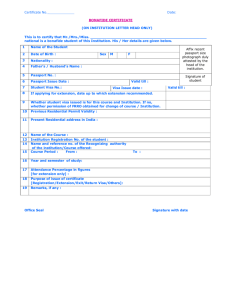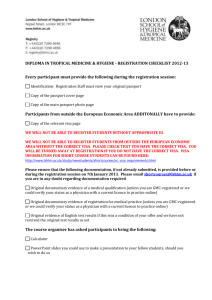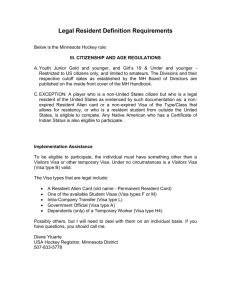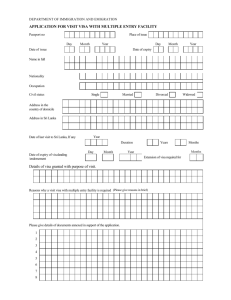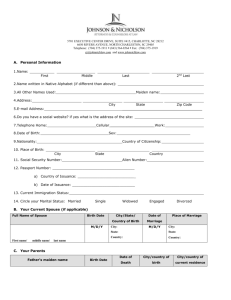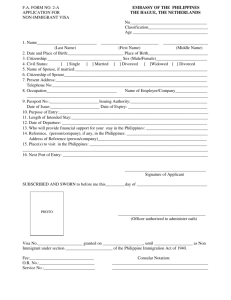Alien Identification Procedures - DOC
advertisement
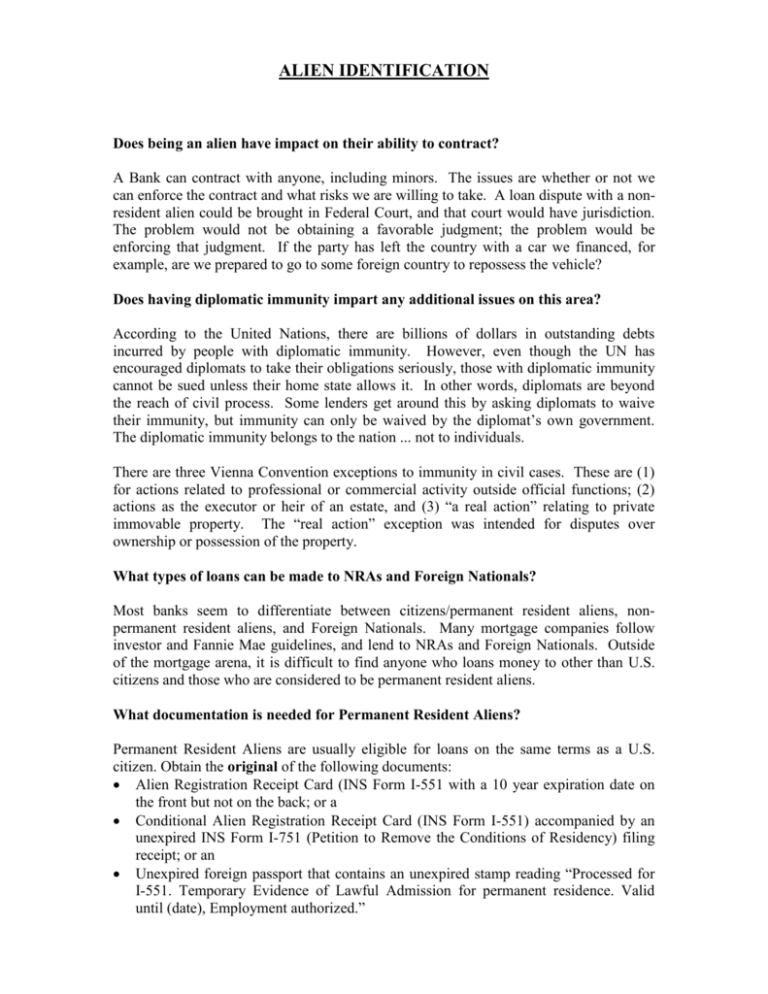
ALIEN IDENTIFICATION Does being an alien have impact on their ability to contract? A Bank can contract with anyone, including minors. The issues are whether or not we can enforce the contract and what risks we are willing to take. A loan dispute with a nonresident alien could be brought in Federal Court, and that court would have jurisdiction. The problem would not be obtaining a favorable judgment; the problem would be enforcing that judgment. If the party has left the country with a car we financed, for example, are we prepared to go to some foreign country to repossess the vehicle? Does having diplomatic immunity impart any additional issues on this area? According to the United Nations, there are billions of dollars in outstanding debts incurred by people with diplomatic immunity. However, even though the UN has encouraged diplomats to take their obligations seriously, those with diplomatic immunity cannot be sued unless their home state allows it. In other words, diplomats are beyond the reach of civil process. Some lenders get around this by asking diplomats to waive their immunity, but immunity can only be waived by the diplomat’s own government. The diplomatic immunity belongs to the nation ... not to individuals. There are three Vienna Convention exceptions to immunity in civil cases. These are (1) for actions related to professional or commercial activity outside official functions; (2) actions as the executor or heir of an estate, and (3) “a real action” relating to private immovable property. The “real action” exception was intended for disputes over ownership or possession of the property. What types of loans can be made to NRAs and Foreign Nationals? Most banks seem to differentiate between citizens/permanent resident aliens, nonpermanent resident aliens, and Foreign Nationals. Many mortgage companies follow investor and Fannie Mae guidelines, and lend to NRAs and Foreign Nationals. Outside of the mortgage arena, it is difficult to find anyone who loans money to other than U.S. citizens and those who are considered to be permanent resident aliens. What documentation is needed for Permanent Resident Aliens? Permanent Resident Aliens are usually eligible for loans on the same terms as a U.S. citizen. Obtain the original of the following documents: Alien Registration Receipt Card (INS Form I-551 with a 10 year expiration date on the front but not on the back; or a Conditional Alien Registration Receipt Card (INS Form I-551) accompanied by an unexpired INS Form I-751 (Petition to Remove the Conditions of Residency) filing receipt; or an Unexpired foreign passport that contains an unexpired stamp reading “Processed for I-551. Temporary Evidence of Lawful Admission for permanent residence. Valid until (date), Employment authorized.” What is a Foreign National? Foreign Nationals are citizens of another country who have a valid visa to live or visit in the U.S. A Foreign National is not a non-permanent resident alien, permanent resident alien or a U.S. citizen. Usually Foreign Nationals do not have Green Cards, and cannot work in the U.S. Some banks will loan to Resident aliens for second home purchases only. (For example, SunTrust offers loan amounts up to $500,000 with a 35% down payment and only 1/1, 3/1, 5/1 and 7/1 ARMS.) Documentation for Foreign Nationals can include: Passport (Passport must show issue and expiration dates, passport number, and photo.) I-94 (front and back) The I-94 is placed in the passport by the Immigration and Naturalization (INS) officer when the Foreign National enters the U.S. Visa and relevant supporting documents as outlined in Appendices A and C. What is a Non-permanent Resident Alien? Non-permanent resident aliens are citizens of another country who reside in the U.S. under a Conditional Resident Alien Card, Temporary Resident Card, work visa, student visa or some other permit for some specified period of time. (Hint: the 9-11 terrorists were in this category!) To consider lending to NRAs, many banks use the following guidelines: Visa Status. must be documented to determine eligibility Visa must allow residency for at least 1 year for owner-occupied properties Purchase only or No Cash out Refinance LTV 80% What are some regulatory concerns in lending to non-U.S. citizens? Because FHLMC does not distinguish between non-permanent resident aliens and any other borrowers, loans are often steered to FHLMC. Unless you have other investors for these loans, this should not be a Reg. B violation. In addition, some banks will make loans to non-resident aliens only when a co-borrower is either a U.S. Citizen or a permanent resident alien. Again, from a Reg. B standpoint, this makes sense, as the bank is ensuring that their collateral is protected if the NRA leaves the country. Banks may need to enlist the services of an immigration lawyer to uncover all the issues surrounding lending to aliens, as this is potentially a high-risk area. Banks may want to limit their exposure by allowing only home-secured loans to non-residents and/or Foreign Nationals, and not allowing any unsecured lending unless the applicant is either a citizen, a permanent resident alien, or is willing to obtain an adequate cosigner. This should be clearly stated in your loan policies. As an additional note, because of the U.S.A Patriot Act and the events of September 11, Banks should be checking the OFAC list for all loan applicants, who fall into the categories we have been discussing. (Non-resident aliens, foreign nationals) Appendix A: DOCUMENTS Passport Identification Pages: All passports, either in the front or back, have identification pages, usually facing, which contain at a minimum, (1) holder's picture, (2) holder's signature, (3) country of issue, (4) holder's permanent address at time of issuance, (5) date of issuance, (6) date of expiration. Some passports have all this information on the same page as the holder's picture. Visa: Document issued by U.S. consulate or embassy granting entry into the U.S. The visa will have a photograph of the holder and will generally be permanently attached in the passport. Certain classes of visas allow the holder to work in the U.S. under conditions specified by the Immigration and Naturalization Service. Other classes of visas are for pleasure or tourism only and do not permit the holder to work in the U.S. Note that, while a visa permits entry into the U.S., Form I-94 Arrival/Departure Record (see below) is determinative of immigration status. I-94 Arrival/Departure Record: Two-part document completed by an individual with a visa at the port of entry for processing by Immigration and Naturalization Service. At the port of entry, INS retains the Arrival Record portion of the document, completes the Departure Record portion with arrival date, visa type, and expiration date (noted on the form as "Admitted until "). The Departure Record may be stapled into the passport or may be left loose. When the individual departs the U.S., INS retains the Departure Record. Thus, for documentation purposes, Form I-94 mU.S.t be copied when the individual is in the U.S. Also note that INS frequently stamps Form I-94 with red ink and uses blue ink to make manual entries in nearly illegible handwriting such that care should be taken when copying the form to ensure readability. Form I-94 is currently white in color. I-94W Visa Waiver Arrival/Departure Record: Similar to Form I-94 except that, since the individual does not have a visa, he/she discloses and certifies certain information to INS. Form I-94W is currently green in color. (See "Visa Waiver Program" in Definitions and Clarifications.) Form IAP-66, Certificate of Eligibility for Exchange Visitor (J-1) Status: U.S. Information Agency form. Form IAP-66 allows the individual to apply for a J-1 visa at a U.S. consulate or embassy. Appendix B: DEFINITIONS AND CLARIFICATIONS Port of entry: The location where an individual enters the U.S. and is processed by INS. Sponsorship: Visa classes which are or may be work authorized involve the concept of formal institutional sponsorship for INS purposes. Documents, which authorize an individual to apply for a visa, establish the basis on which that individual may receive payment from sources within the U.S. Canadian citizens: Are not required to obtain either a visa or visa waiver in order to enter the U.S. However, Canadians who enter the U.S. without establishing any other status are presumed to be in the country for pleasure and would be considered on B-2 status. Submission of Form IAP-66 confers J-1 status on a Canadian at the port of entry. Alternatively, Canadians may also apply for B-1 status at their port of entry. Immigration status will be indicated on the Form I-94 Arrival/Departure Record if the form has been obtained. Visa Waiver Program: Visitors from the countries listed below may enter the U.S. for business or pleasure purposes for up to 90 days without a visa. Persons on visa waiver may not accept unauthorized employment or attend school. Once in the U.S. on a visa waiver, they may not change status while in the country. Andorra, Argentina, Australia, Austria, Belgium, Brunei, Denmark, Finland, France, Germany, Iceland, Ireland, Italy, Japan, Liechtenstein, Luxembourg, Monaco, The Netherlands, New Zealand, Norway, San Marino, Spain, Sweden, Switzerland, and the United Kingdom. INS (Immigration and Naturalization Service): Federal agency charged with enforcing laws and regulations, which determine the kinds of payments (compensation, reimbursement, etc.), that may legally be made, based on an individual's immigration status. IRS (Internal Revenue Service): Federal agency charged with enforcing laws and regulations which: (1) determine whether or not income tax must be withheld from payments, including payments to third parties on a visitor's behalf, and (2) require that all payees receiving compensatory payments must obtain a tax identification number. Appendix C: TABLE OF RELEVANT NONIMMIGRANT VISA CLASSES SYMBOL B-1 B-2 B-1/B-2 BBBCC Border crossing card equivalent to B1/B-2 visa. F-1 H-1B J-1 O-1 P-1A P-1B P-2 CLASSIFICATION Visitor for business. No work authorization Visitor for pleasure. No work authorization Status determined by I-94. No work authorization Status determined by I-94. No work Authorization Mexican citizens entitled to multiple entries Student Work authorized under limited circumstances Student enrolled in degree-granting program Exchange visitor Work authorized under certain circumstances Visiting scholar, teacher or researcher Exchange student, not enrolled in degree-granting program Individual of extraordinary ability in sciences, arts, education, business or athletics. Work authorized for sponsoring organization Internationally recognized athlete or athletic team Work authorized for sponsoring organization Internationally recognized entertainment group Work authorized for sponsoring organization Artists or entertainers under reciprocal exchange program Work authorized for sponsoring organization P-3 Culturally unique artists or entertainers Work authorized for sponsoring organization WB Waiver for business No work authorization WT Waiver for tourism No work authorization
